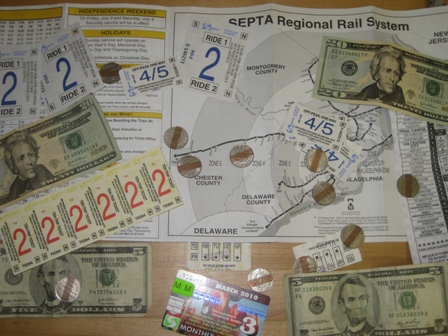SEPTA fare hearings are underway

April 20, 2010
By Anthony Campisi
For PlanPhilly
Rider advocates continued their criticism of SEPTA’s proposed fare increases at a public hearing on Monday.
The authority said it’s seeking a 6 percent increase in revenue to support a $1.18 billion operating budget in fiscal year 2011 as well as rising pension and health care costs. It also estimates a 10 percent jump in electric power costs when rate caps expire at the end of the year.
Matt Mitchell of the Delaware Valley Association of Rail Passengers submitted an alternative fare proposal to retired Judge James Colins, an independent hearing examiner who has been holding a series of public meetings on the fare and budget proposals in the city and suburbs.
The transit riders’ group wants SEPTA to reduce the transfer fare from 75 cents to 50 cents and to retain weekday off-peak trains and the existing zone structure for regional rail. The authority wants to keep the cash fare level and raise the price of a transfer to $1. The DVARP proposal would also reduce the size of fare hikes for regional rail riders — the average regional rail rider is in for a hike of about 9 percent under the current SEPTA plan.
The group says SEPTA could pay for the smaller fare hikes by raising the cash fare 25 cents to $2.25, which it says will bring in $8 million a year.
Mitchell said the authority could retain weekday, off-peak fares on regional rail — which SEPTA wants to eliminate — without losing budgeted revenue because SEPTA’s budget analysis didn’t account for revenue increases that would result from the change. The DVARP also wants SEPTA to raise parking permit prices at most regional rail stations by $5. Though it admits that proposal would bring in slightly less than the $47.8 million SEPTA says it would raise with its fare proposal, the group argues the lost revenue will be more than made up in the form of generating public goodwill.
Philadelphia consumer advocate Lance Haver also criticized parts of the fare policy, arguing that a hike in the price of a transfer would hit occasional riders more than daily commuters. He is seeking more information from SEPTA about its plans to buy electricity in bulk with Amtrak.
Haver argued that the authority could achieve more savings by partnering with an entity that uses a lot of electricity in off-peak periods, citing that Amtrak electricity usage spikes at the same time as SEPTA usage does. He said the Philadelphia School District and the Streets Department achieved savings in this way — the School District uses a lot of power during the day, while the Streets Department uses electricity at night to run street lights. Haver also said that SEPTA should explore selling adds on its webpage and should mobilize its riders to push for a restoration of dedicated funding, lost by the failure to toll Interstate 80. “We don’t always know what’s going on,” Haver said, adding that it makes it difficult for riders to support SEPTA without information.
Though a representative of the Brotherhood of Locomotive Engineers and Trainmen said the union, which represents regional rail workers, supports SEPTA’s budget and fare proposals, it wants the authority to reevaluate the elimination of weekday off-peak fares six months into the new fiscal year to be sure that the change hasn’t increased the number of passengers riding crowded rush-hour trains.
And Patricia Russell, chairwoman of the SEPTA Advisory Committee for Accessible Transportation, a disabled rider advocacy group, called for changes to SEPTA’s fare policy for disabled riders.
The group wants the disabled to be able to pay the reduced disabled fare — now at 75 cents, though SEPTA wants to raise it to $1 — on peak hour vehicles. Currently, riders taking the system during rush hour have to pay full fare.
And she also wants SEPTA to give the disabled free rides on weekends and holidays — which senior citizens currently get through a state program to subsidize their rides. Several other disabled riders living on a fixed income also complained that the fare increases would take a bigger bite out of their wallets. “SEPTA’s becoming unaffordable,” according to Thaddeus Robinson, who heads policy planning for the group.
Colins, the hearing examiner, will wrap up testimony on SEPTA’s operating budget Tuesday in Doylestown and will hold capital budget hearings at 11 a.m. and 5 p.m. April 21 at SEPTA’s Center City headquarters. He will also be accepting written testimony sent through SEPTA through 5 p.m. on April 26.
Colins will then make a nonbinding recommendation to the SEPTA Board about the staff proposals for the operating and capital budgets, and the board will vote on them at a public hearing.
Contact the reporter at campisi.anthony@mail.com
WHYY is your source for fact-based, in-depth journalism and information. As a nonprofit organization, we rely on financial support from readers like you. Please give today.



